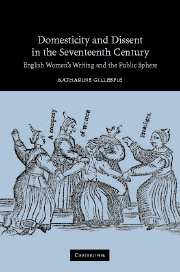Book contents
- Frontmatter
- Contents
- Acknowledgments
- Introduction: Sabrina versus the state
- 1 “Born of the mother's seed”: liberalism, feminism, and religious separatism
- 2 A hammer in her hand: Katherine Chidley and Anna Trapnel separate church from state
- 3 Cure for a diseased head: divorce and contract in the prophecies of Elizabeth Poole
- 4 The unquenchable smoking flax: Sarah Wight, Anne Wentworth, and the “rise” of the sovereign individual
- 5 Improving God's estate: pastoral servitude and the free market in the writings of Mary Cary
- Conclusion
- Index
Introduction: Sabrina versus the state
Published online by Cambridge University Press: 22 September 2009
- Frontmatter
- Contents
- Acknowledgments
- Introduction: Sabrina versus the state
- 1 “Born of the mother's seed”: liberalism, feminism, and religious separatism
- 2 A hammer in her hand: Katherine Chidley and Anna Trapnel separate church from state
- 3 Cure for a diseased head: divorce and contract in the prophecies of Elizabeth Poole
- 4 The unquenchable smoking flax: Sarah Wight, Anne Wentworth, and the “rise” of the sovereign individual
- 5 Improving God's estate: pastoral servitude and the free market in the writings of Mary Cary
- Conclusion
- Index
Summary
this I hold firm,
Vertue may be assail'd, but never hurt,
Surpriz'd by unjust force, but not enthralled
John Milton, ComusTHE ADVENTURES OF THE POSSESSIVE SELF
In the anonymously published 1637 version of A Maske Presented at Ludlow Castle, Milton narrates the “birth” of the possessive individual. Liberally paraphrased, the story goes something like this:
The Lady could take it no longer. She had been so determined to remain silent while Comus, the seductive Cavalier, plied her virgin ears with seductive sweet talk and such “false rules pranckt in reasons garb” (157) as the sophistical notion that virginity was fool's gold. True “good,” he had cooed, “Consists in mutual and partak'n bliss,” and then he had punned naughtily: “Beauty is natures coyn,” therefore, it “must not be hoorded” but spent, if you know what I mean, if it wants to “be currant” (156).
But the Lady knew what he meant and so, betraying the mark of a true “democratic personality” – one who is compelled to speak even when it is not altogether convenient to do so – she unlocks her lips and lets her tongue fly: “It doesn't matter how much you “wave” your “wand” around, you can never “touch the freedom of my mind” (153). And anyway, I know what “good” means – “Should I go on? Should I say more” – well then, if you need for me to explain “the sage and serious doctrine of Virginity” to you then think again because you're not “fit to hear thyself convinct” (158). […]
- Type
- Chapter
- Information
- Domesticity and Dissent in the Seventeenth CenturyEnglish Women Writers and the Public Sphere, pp. 1 - 24Publisher: Cambridge University PressPrint publication year: 2004



